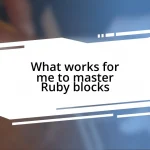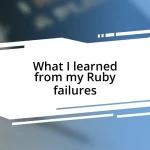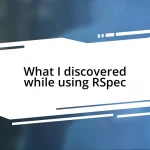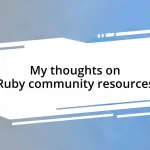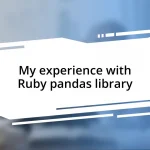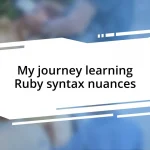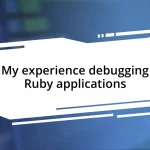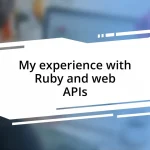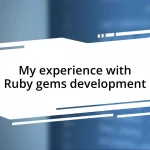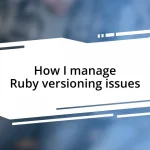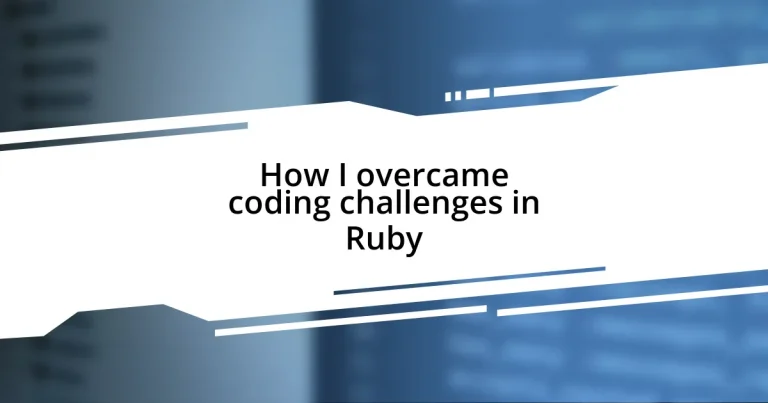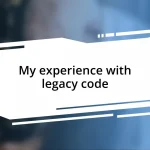Key takeaways:
- Overcoming common coding challenges in Ruby involved mastering string and array manipulation, understanding object-oriented programming, and developing effective debugging strategies.
- Utilizing Ruby’s elegant syntax and dynamic typing, along with built-in methods like `inject`, enhanced coding efficiency and enjoyment.
- Engaging with online communities and resources, such as Stack Overflow and video tutorials, provided essential support and boosted learning opportunities.
- Practicing through real projects and seeking feedback from peers fostered collaboration and propelled personal growth as a developer.
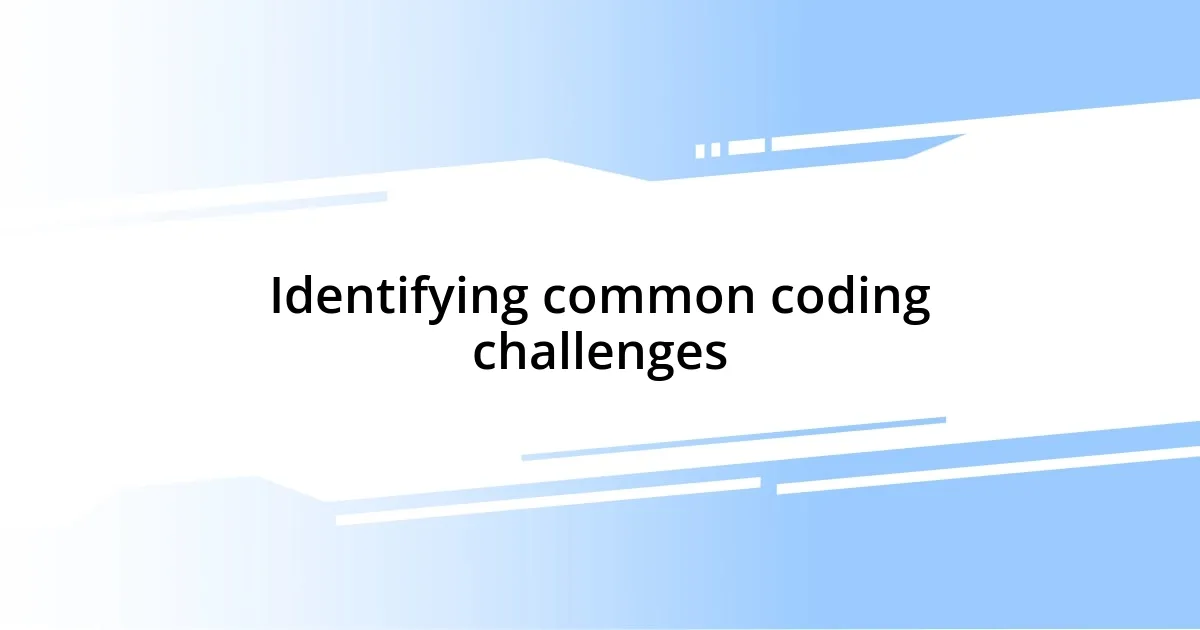
Identifying common coding challenges
When I first started coding in Ruby, I quickly realized that certain challenges kept reappearing. One of the most common hurdles was understanding how to manipulate strings and arrays efficiently. I remember spending hours trying to figure out methods like map and select, only to find that a small tweak in my approach could unlock powerful solutions.
Another significant challenge I encountered was grasping the concept of object-oriented programming (OOP). The idea of creating and managing classes and objects seemed daunting at first. I often found myself wondering, “Why do I need to use classes when I can just write a few functions?” It wasn’t until I embraced OOP that I recognized its value in organizing my code and enhancing reusability.
Debugging was another persistent battle, often leading to frustration. There were days when I felt like I was chasing my tail, trying to decipher error messages that seemed cryptic. I learned to view those moments not as setbacks but as learning opportunities. Each bug I resolved not only sharpened my coding skills but also shifted my mindset towards seeing challenges as stepping stones in my journey.
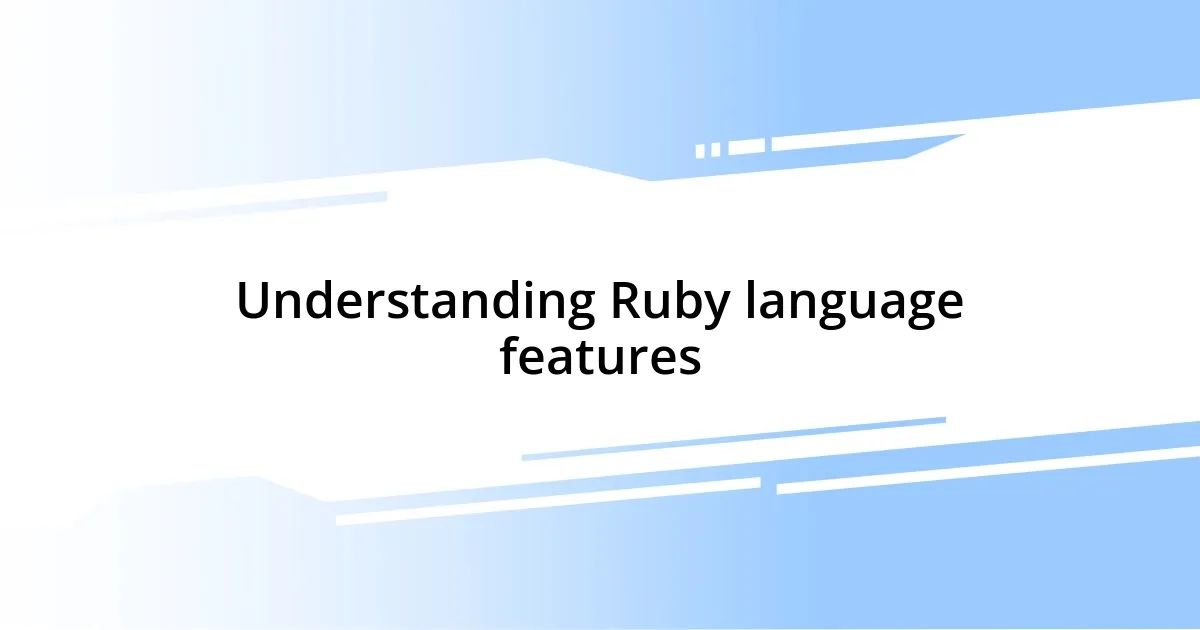
Understanding Ruby language features
Understanding Ruby’s language features is a crucial step to becoming proficient. One of the most striking features of Ruby is its elegant syntax, which often feels like reading English. I remember the thrill of writing code that seemed so clean and intuitive. This readability not only made my programs easier to write but also more enjoyable to maintain.
Another impressive aspect of Ruby is its dynamic typing system. At first, this was a double-edged sword for me. I loved the flexibility it offered, but I often found myself in tough situations where bugs crept in silently due to type mismatches. It took time, but I learned to embrace the dynamic nature by using tools like RSpec for testing. It introduced me to the value of writing tests that helped catch errors early on.
Lastly, Ruby’s rich set of built-in methods truly blew my mind. For example, I had a moment of clarity when I discovered the inject method. It became a game changer in terms of how I handled array processing. One day, I was struggling with a complex summation problem; using inject not only solved it elegantly but also left me feeling a sense of satisfaction that I had found a Ruby idiom that made the code shine.
| Feature | Description |
|---|---|
| Elegance | Ruby’s syntax is clean and readable, enhancing code maintainability. |
| Dynamic Typing | Allows flexible coding, though it can lead to silent type-related bugs. |
| Built-in Methods | Rich set of methods like `inject` simplify complex operations. |
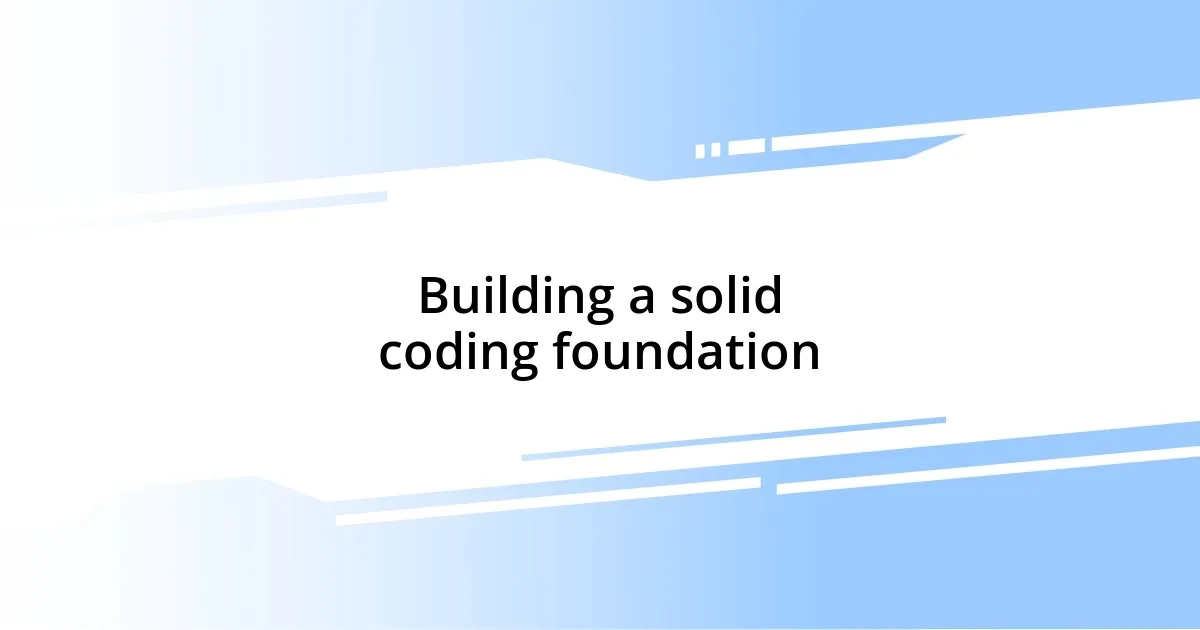
Building a solid coding foundation
Building a solid coding foundation in Ruby is all about grasping the essentials that underpin the language. I vividly remember my early days when I focused intensely on mastering the core concepts. Each time I learned about variables, control structures, and methods, it felt like I was laying down bricks in a sturdy wall. Those foundational skills became my safety net whenever I faced more complex challenges.
Focusing on the basics helped me avoid common pitfalls. Here are some fundamental coding concepts that I found invaluable:
- Variables: They store data and allow you to manipulate it easily.
- Control Structures: Understanding conditionals (
if,else) and loops (while,for) was pivotal for managing the flow of my programs. - Methods: They encapsulate functionality, making my code reusable and organized.
- Data Structures: Knowing when to use arrays versus hashes helped me write more efficient code.
- Error Handling: Early on, I learned the importance of handling exceptions, making my programs more robust.
Each concept, while simple, built the scaffold for the more advanced features I would tackle later. Embracing these basics early on made every challenge considerably less daunting, creating a lasting sense of confidence that I still rely on today.
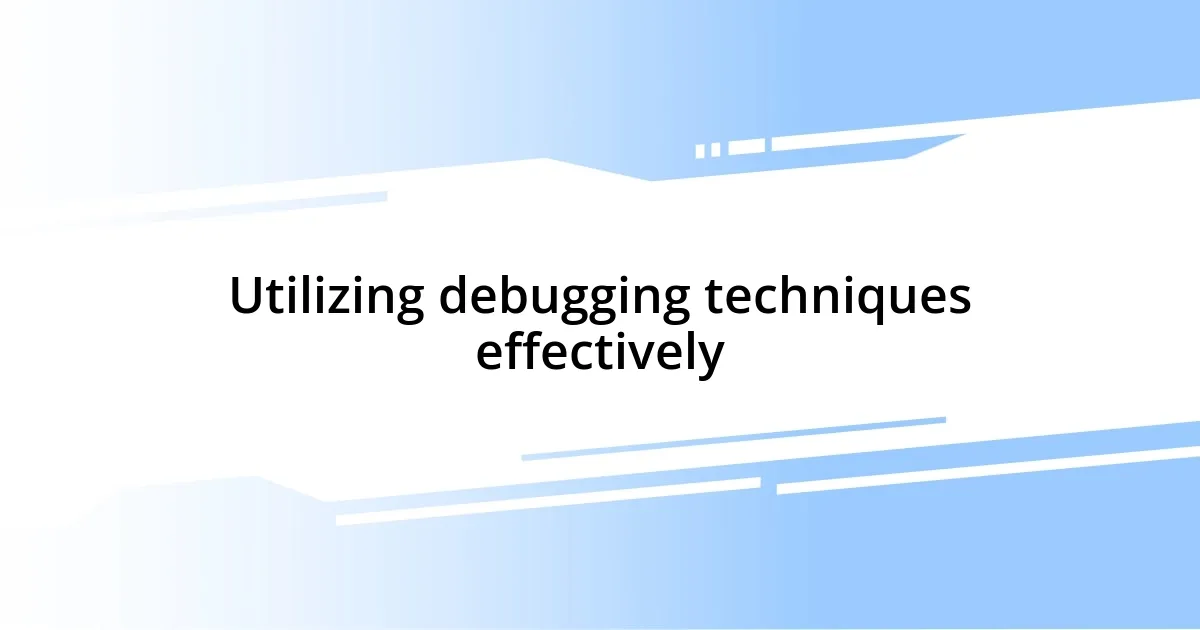
Utilizing debugging techniques effectively
When I first delved into debugging, it felt like entering a maze; often, I’d wander aimlessly, frustrated. The key for me was learning to leverage tools like byebug. Setting breakpoints allowed me to pause execution and examine variable states—an absolute lifesaver! I remember a day when a simple typo was hiding a significant bug. By stepping through the code line by line, I not only found it but also learned to appreciate the debugging process as a form of active learning.
Another technique that transformed my approach was utilizing logging effectively. Rather than just relying on error messages, I started embedding log statements throughout my code. This offered me insights into how my program was behaving in real-time. I can recall a particularly challenging project where these logs turned into breadcrumbs, leading me straight to the source of an elusive performance issue. It was like being a detective, piecing together clues to solve the mystery lurking within my code.
As I became more comfortable with debugging, I found that asking the right questions was an essential part of the process. Instead of asking, “What’s wrong with my code?” I learned to ask, “What do I expect this code to do?” Shifting my focus helped me identify discrepancies. I often reflect on instances when this mindset shift led to breakthroughs, turning moments of frustration into opportunities for learning and growth. Establishing this habit made tackling challenges more of an adventure rather than a chore, and I think that perspective is invaluable for any developer.
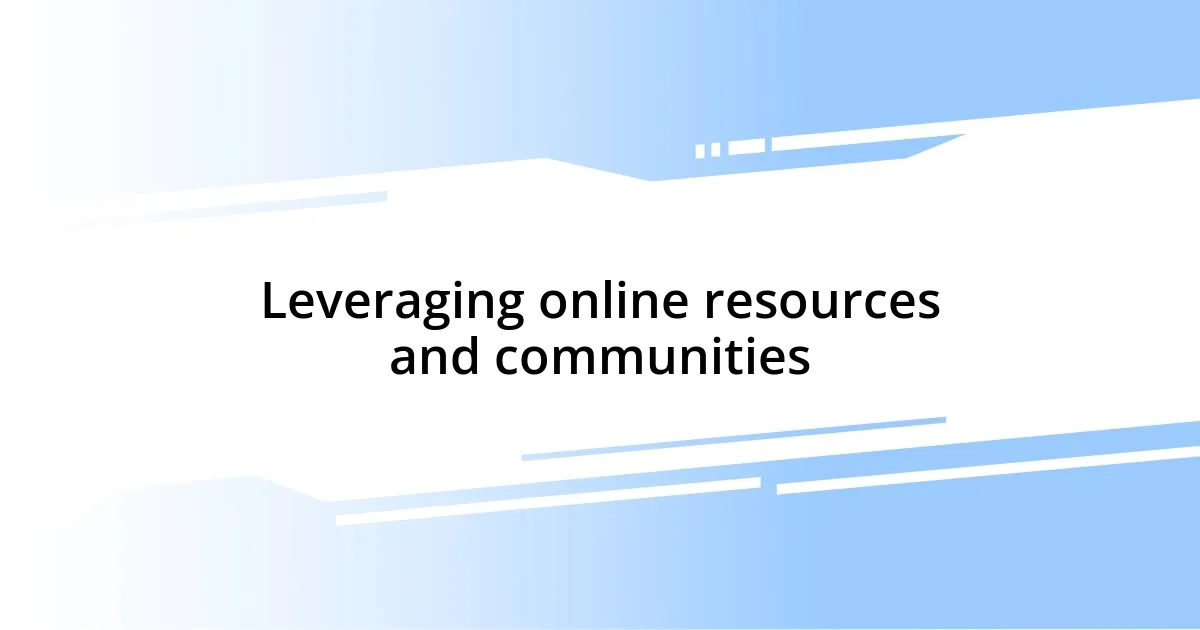
Leveraging online resources and communities
I found that online resources and communities were like a treasure trove when faced with coding challenges in Ruby. One evening, after hours of wresting with a particularly gnarly error, I decided to seek help on Stack Overflow. The moment I posted my question, I felt a wave of relief flood over me; there were developers eager to share their insights. Sure enough, within minutes, a few seasoned Rubyists chimed in, offering solutions that turned my confusion into clarity. It was astounding how quickly a sense of camaraderie emerged in that online space.
The power of video tutorials can’t be overstated, either. I remember stumbling upon a YouTube channel dedicated to Ruby programming. Watching experienced developers walk through complex challenges felt like having a seat in an engaging classroom. Each video helped demystify intricate concepts—I can still picture that lightbulb moment when I finally grasped the ActiveRecord query interface. It’s that blend of visual and practical learning that makes online resources so effective; it allows for an interactive experience rather than passive consumption.
Joining coding communities on platforms like Discord and Reddit was another game-changer for me. I recall a late-night session where I shared my struggles with a user group. They not only provided immediate feedback but also fostered an environment where we could brainstorm solutions together. Isn’t it comforting to know that you’re not alone in this journey? Having a community to lean on is like having a safety net; it reinforces the idea that coding is not just a solitary activity, but a collaborative adventure.
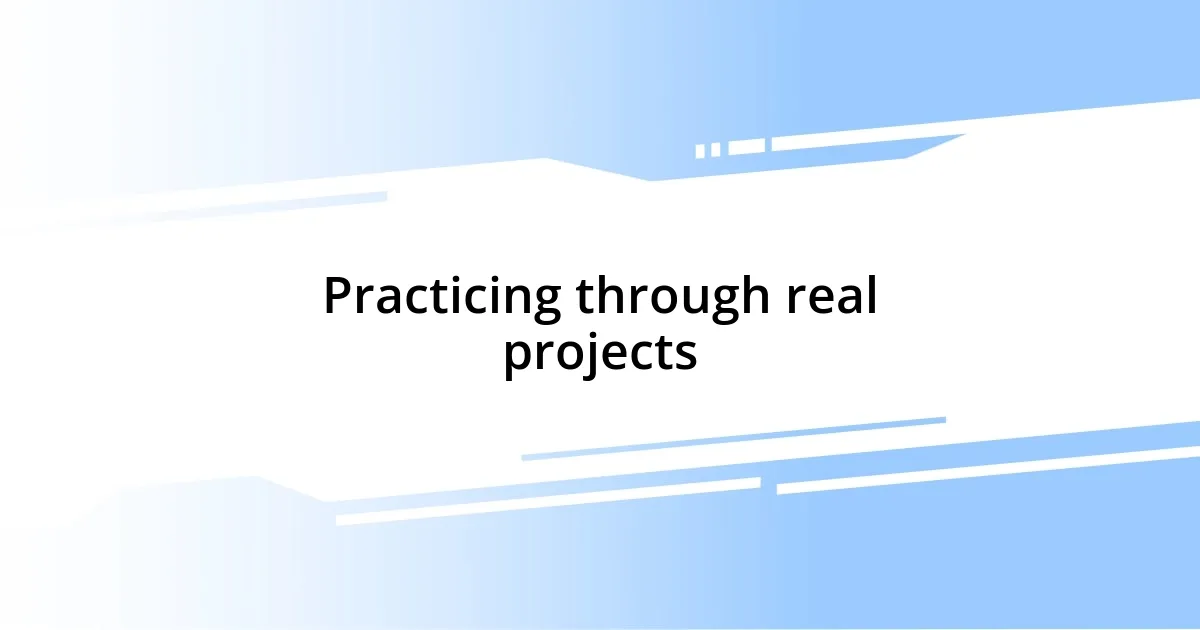
Practicing through real projects
Real projects provided me with a playground to experiment and refine my Ruby skills. I remember my first significant project—an inventory management system for a small business. The challenges I encountered were plentiful, but each obstacle became a stepping stone. Navigating through this project taught me to break down tasks and tackle them systematically. It was like assembling a puzzle; each piece of code fit together, revealing not just a functional application but also my growth as a developer.
Working on actual projects helped me confront the murky waters of ambiguity that often come with coding. There was a time when I was trying to integrate a payment gateway, and the documentation felt overwhelming. In that moment, instead of running away from the complexity, I decided to embrace it. I broke the integration down into smaller chunks and celebrated each mini-victory along the way. That experience transformed not just my understanding of Ruby, but also how I approach challenges—making it clear that persistence can turn confusion into clarity.
Additionally, collaborating with others on projects proved invaluable. I vividly recall partnering with a friend on a web application. We would spend hours brainstorming features, and that back-and-forth really sparked creativity. Have you ever had that moment when shared ideas elevate the project beyond what you initially imagined? It felt invigorating, and I learned that coding is often best done in collaboration; sharing perspectives uncovers new solutions and fuels motivation to push through tough spots. The experience illuminated the essence of teamwork in coding—creating something greater than what we could accomplish alone.
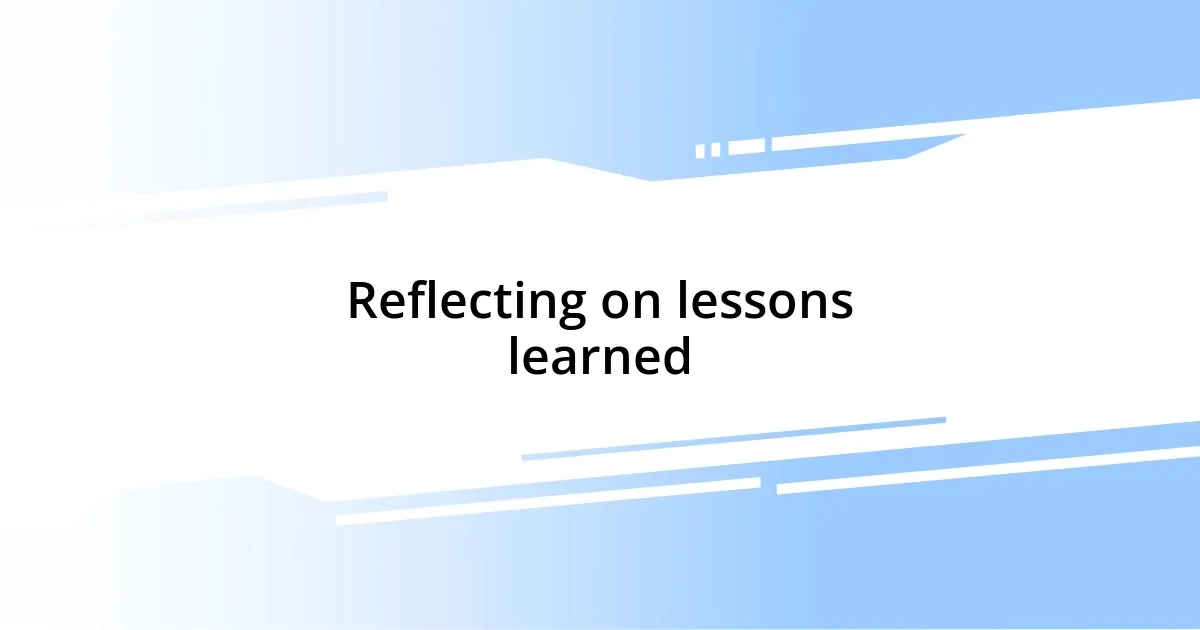
Reflecting on lessons learned
Reflecting on the lessons learned during my coding journey has been both enlightening and humbling. One key takeaway for me was realizing the importance of patience. There were moments when I felt like giving up, especially when faced with a stubborn bug that refused to be fixed. I learned that stepping away from my screen, taking a breath, and returning with a fresh perspective often led to breakthroughs. Has that ever happened to you? It’s fascinating how clarity can emerge from a little distance.
I also discovered how critical self-compassion is in the learning process. In the beginning, I often berated myself for making mistakes or struggling with concepts that seemed simple for others. Over time, I learned to embrace those challenges as part of growth. I still remember the first time I successfully refactored a piece of code that had haunted me for weeks—I felt like I had climbed a mountain! This shift in mindset taught me that every misstep is a chance to learn, and transforming frustration into curiosity opens doors to unexpected solutions.
Lastly, I found that seeking feedback—whether from mentors or peers—was instrumental in my development. Early on, I hesitated to share my work, worried about judgment or criticism. But once I opened up, I found that constructive feedback was a springboard for improvement. I recall a session with a mentor who tore my code apart with kindness, pointing out areas for enhancement. Rather than feeling defeated, I felt invigorated; it was like seeing a map that led to uncharted territories in my coding skills. Have you had similar experiences? Engaging with others not only sharpens one’s technical abilities but also fosters connections that can turn coding into a more enriching experience.

